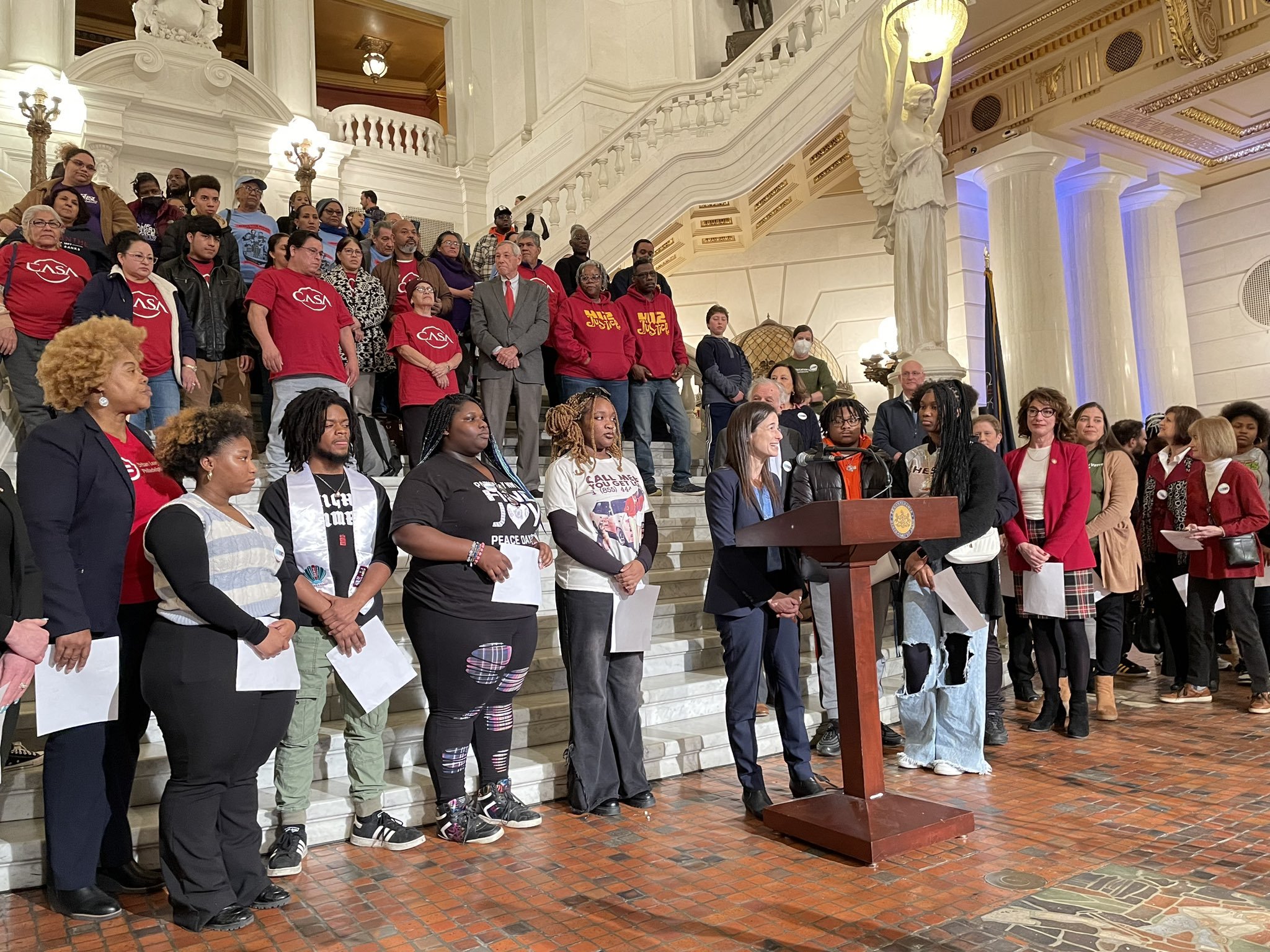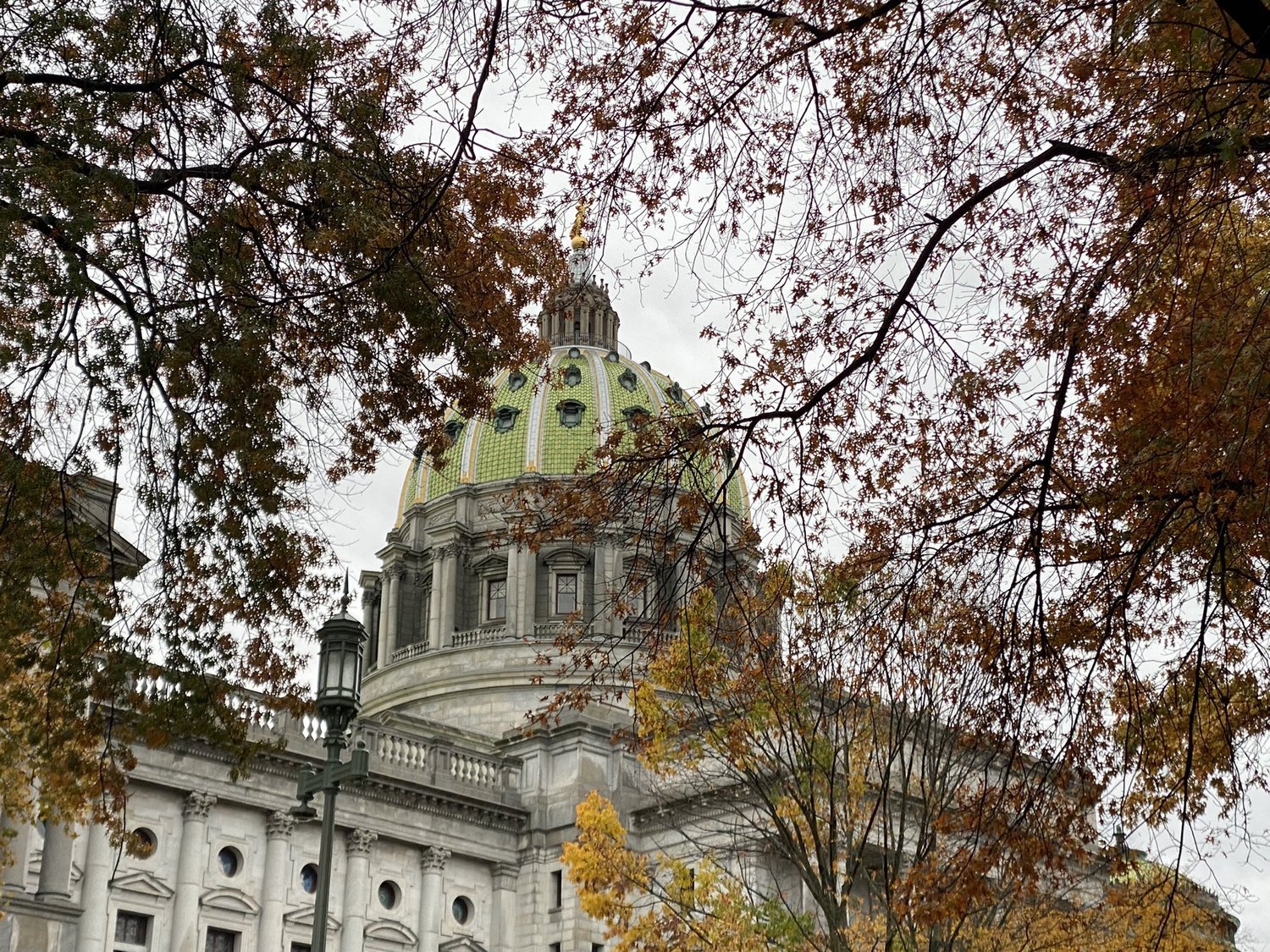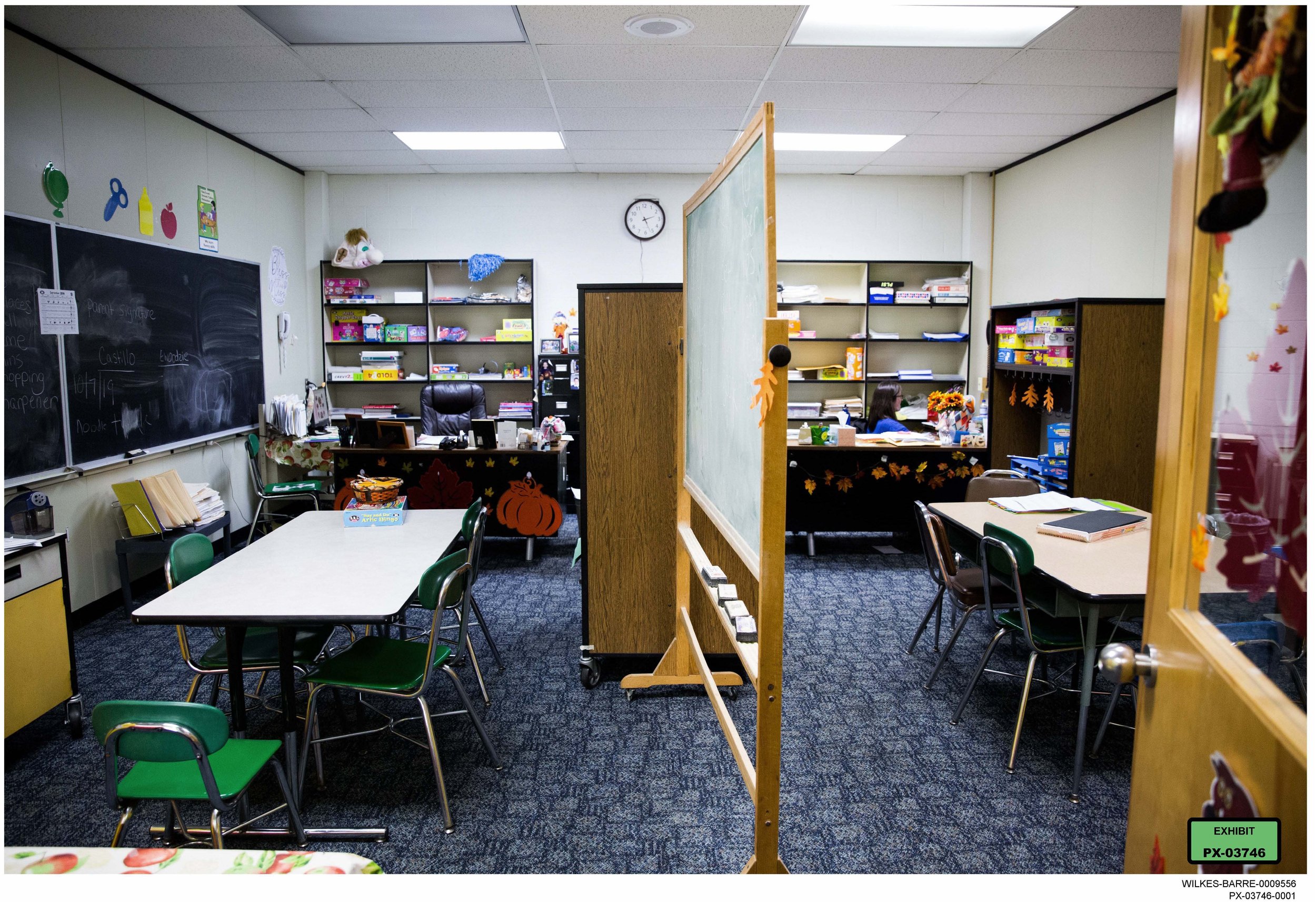“Last July, in a historic bipartisan agreement, the General Assembly and the governor admitted that Pennsylvania underfunds its schools by more than $4.5 billion and took the first step toward fixing it, allocating $500 million to the state’s most underfunded districts. These were necessary steps to respond to Commonwealth Court’s February 2023 decision declaring Pennsylvania’s school funding system inequitable, inadequate, and unconstitutional.”
Read moreState officials recognize massive adequacy gap for public schools. Now they must fill it.
Statement from Education Law Center & Public Interest Law Center on state budget agreement
Commonwealth Court’s school funding decision requires something plain from state officials: a plan “to provide all students in every district throughout Pennsylvania with an adequately funded education."
Pennsylvania children still await such a plan.
But even though legislators artificially reduced the size of the state’s funding shortfall by undercounting students in poverty, at least now there is bipartisan agreement that adequately funded education requires, at minimum, an additional $4.5 billion, distributed to the communities that need it most.
The first step to fixing a problem is admitting it exists. While understating the problem, state officials of both parties now agree that there is a massive adequacy gap.
And the funds distributed this year through the new adequacy formula are critical, desperately needed, and will be used to hire the teachers, tutors, and counselors that students deserve.
But the second step to fixing a problem is actually fixing it.
Students need public schools that provide the support they need to reach meaningful opportunities today, not some day in the far future. And the same budget legislation that admits the scope of the Commonwealth’s constitutional shortfall still leaves nearly 90 percent of that hole to be filled by some undefined date in the future, or not at all.
The Pennsylvania Constitution requires more. The governor and General Assembly have acknowledged the wide scope of the problem. Now, they must identify the timeline by which the students of Pennsylvania will receive the funding the Constitution demands and do so with the urgency that children deserve and need.
Every child, every community: The long-term plan for strong public schools in Pennsylvania
Check out an interactive map to see how the long-term plan for comprehensive public school funding adopted by the Pennsylvania House in June 2024 would close the adequacy gaps across Pennsylvania.
A serious long-term plan for a new public school funding system that lives up to the promise of our state constitution has now passed the Pennsylvania House of Representatives. It’s up to all of us to tell our leaders in the Pennsylvania Senate to finish the job for our students and pass this plan into law.
Read moreHow HB 2370, the Long-Term Plan for Constitutional Public School Funding, Works for Pa. Communities
We have one—and only one—long-term plan on the table for public school funding that respects students’ fundamental constitutional right to education. That’s HB 2370. Learn more about how this transformative long-term plan was developed, how it works for Pennsylvania communities, and how you can advocate for it to be passed into law.
Read moreBreakthrough! PA House Approves Comprehensive School Funding Plan in Bipartisan Vote
The legislation commits the state to raise funding levels for 367 underfunded districts over seven years by $5.1 billion to fill adequacy gaps, and it provides $1 billion in financial relief over the same period to communities that have shouldered a heavy local tax burden due to state underfunding.
Read morePennsylvania House Education Committee takes historic step for Pa. public schools
The House Education Committee convened on June 4, 2024, and voted to pass House Bill 2370, groundbreaking school funding legislation.
Statement from Education Law Center and Public Interest Law Center on HB 2370, comprehensive public school funding legislation
The Pennsylvania House Education Committee passed House Bill 2370 on June 4: groundbreaking, comprehensive school funding legislation that will, if passed into law, transform the lives of thousands of Pennsylvania students by establishing a long-term plan to equitably and adequately fund our public schools according to student needs.
H.B. 2370 begins to answer the call to action required by Commonwealth Court, which ruled that our school funding system is unconstitutional—finding that students in low-wealth school districts are being denied their constitutional right to a quality education.
Read moreOur remarks on the anniversary of Commonwealth Court's school funding decision
Parents, students, educators and advocates gathered in the Pennsylvania State Capitol Rotunda to commemorate the anniversary of Commonwealth Court’s decision finding our public school funding system unconstitutional. Photo from Education Voters PA.
One year ago today, Commonwealth Court ruled that Pennsylvania’s school funding system is unconstitutional and must be reformed. Now, there is a potentially transformational plan on the table, developed by the Basic Education Funding Commission and affirmed by Governor Josh Shapiro in his Feb. 6 budget address.
Read moreJoint Statement from Law Centers On Historic Budget Proposal From Gov. Shapiro
The summary statement in Gov. Shapiro’s budget book proposing a major step toward closing funding shortfalls.
Education Law Center and Public Interest Law Center issued this joint statement in response to Gov. Josh Shapiro’s annual budget address on Feb. 6, 2024.
We commend Gov. Shapiro for today’s historic commitment to address the needs of all Pennsylvania’s school children. Last year Gov. Shapiro promised to develop a plan to bring Pennsylvania’s school funding system into constitutional compliance. Building on the work of the Basic Education Funding Commission, he has kept that promise, and we applaud him for it. Today’s proposal includes every first-year recommendation proposed by the commission.
Read moreBasic Education Funding Commission Releases a Proposal that Could Make a Life-Changing Difference for Pennsylvania Students
The Pennsylvania State Capitol
Today, the Basic Education Funding Commission took the first step towards developing a public school funding system based on what students need statewide—not on local wealth. We applaud the commissioners for taking their constitutional duty seriously, and putting forward and adopting a plan that, if fully implemented, would make a life-changing difference for our students.
Read moreOpinion: We have the opportunity to reform education in Pennsylvania; our leaders shouldn’t squander it
The Pennsylvania State Capitol
The petitioners that brought this challenge will uphold the rights of their communities and of Pennsylvania’s children to the education they deserve. Rather than staring down enforcement litigation, the governor and General Assembly can get this right.
Read moreSuperintendents and Attorneys in the School Funding Lawsuit Testified to the Basic Education Funding Commission
David McAndrew, superintendent of Panther Valley School District, testifies before the Basic Education Funding Commission
Their testimony described Commonwealth Court’s decision, tasks before the commission, and the effects of the current unconstitutional funding system on students.
Read moreWhat Is the Cost to Provide Adequate Education to Every Pa. Student? We Now Have an Answer
Now we have new information about how badly students in districts across the state are being shortchanged. Pennsylvania’s Basic Education Funding Commission heard a school funding expert’s report on that at its first hearing, held Sept. 12, 2023, in Harrisburg.
This new analysis of Pennsylvania’s public school funding system by school funding expert and Penn State College of Education professor Matthew Kelly provides us with a clear estimate of the cost in each school district in the state to provide an adequately funded education for all their students – the district’s adequacy target. The new study, based on current state standards and current costs, also calculates how far each district is from reaching that adequacy target – their adequacy gap or shortfall. The study found that:
Altogether, districts statewide need a funding increase of more than $6.2 billion a year to give students a meaningful opportunity to succeed civically, academically, and socially.
The lowest-wealth school districts account for 20% of the state’s students, but 51% of the statewide adequacy gap.
Four out of five school districts lack the funding they need to support student success – 412 districts in all.
In 157 school districts, serving more than 680,000 students, the shortfall is $4,000 or more per pupil. The districts with the largest per-pupil gaps include urban, suburban, and rural districts.
Black and Latinx students are concentrated in these districts, with 43% of the state’s Black and Latinx students attending districts in the lowest-wealth 20%.
The $6.2 billion estimate is a comprehensive assessment. It factors in what districts would need to provide classroom instruction, special education, transportation, career and technology education, and student services. It also includes districts’ costs for charter school reimbursement and pension contributions. However, it does not include the costs of pre-K or of providing safe and adequate facilities.
A fully funded system is not out of reach. To fill the funding gap would require a 20% increase in overall education spending.
Read Dr. Kelly’s report in full.
Dr. Kelly’s study calculates adequacy targets for each district by first analyzing the spending levels in districts that are succeeding according to the state’s own academic standards, taking into account the needs of students who need more support, such as students who are learning English and students who receive special education. The resulting adequacy targets represent the funding levels necessary for each district to be able to provide the same level of resources as successful districts do, relative to the needs of their student body.
View a map of the shortfalls Kelly found in Pennsylvania public schools.
As this analysis demonstrates, and as the court found, our General Assembly has failed to live up to its constitutional duty to ensure that kids in every community can receive a quality education. Right now, the poorest school districts serve the students who need the most support, and have the fewest resources to meet those needs. Because of our two-tiered funding system, divided by local wealth, the poorest quintile of school districts spend $6,230 less per student than the wealthiest, relative to their students’ need.
And this underfunding isn’t some abstract principle. It is teachers and counselors. Nurses and librarians. Computers and STEM labs. Art and music. Smaller class sizes and remedial help for children who are struggling to learn. And more!
As the Commonwealth Court held, students in districts without these essentials are being denied their fundamental right to a comprehensive, contemporary, and effective education, guaranteed by the state constitution. We now have a court ruling in Pennsylvania that says this must change. It is time for state officials to take action to comply with the court’s ruling by fully, adequately, and equitably funding our public schools
The Basic Education Funding Commission: How you can help make fair school funding a reality
The Pennsylvania State Capitol
The work to build a new school funding system in response to the Court’s ruling has begun, with hearings held by the Basic Education Funding Commission—a bipartisan panel of legislators and Pennsylvania education officials.
Read moreLegislative leaders will not appeal to the PA Supreme Court in the school funding lawsuit
Legislative leaders will not appeal to the PA Supreme Court in the school funding lawsuit. The deadline was Friday, July 21, at midnight.
Read moreOur statement on the 2023-24 Pennsylvania Budget
A classroom in Kistler Elementary in Wilkes-Barre divided with classroom furniture--a white board and a coat rack--so that two classes can be held at once. This photo was shown during trial testimony.
The increases in this year’s budget, while appreciated, do not fundamentally change the unconstitutional and unacceptable status quo.
Read moreCommonwealth Court denies legislative leaders’ motion for post-trial relief in school funding case; clock for possible appeal starts now
Today, Commonwealth Court President Judge Renée Cohn Jubelirer again ruled in favor of petitioners in Pennsylvania’s school funding lawsuit, denying a motion for post-trial relief filed in February by Senate President Pro Tempore Kim Ward and House Minority Leader Bryan Cutler.
Read moreOur statement on Gov. Shapiro's PA state budget address
Today, Gov. Shapiro issued a call to action for “a once-in-a-lifetime opportunity for us to do right by our kids, to fund our schools.” We are grateful for the governor’s leadership, and we look forward to working with the governor to find a comprehensive solution that "ensures every child has access to thorough and efficient education." As he recognized, the current budget proposal does not do that.
This work must begin without delay. This year’s proposed education budget does not do enough to meet the standard set by our state constitution and the urgency of this moment.
Read morePennsylvania's School Funding System Declared Unconstitutional in Historic Victory for Students
February 7, 2023 - Today, Commonwealth Court Judge Renée Cohn Jubelirer ruled that Pennsylvania’s school funding system is unconstitutional and must be reformed.
In a 786-page decision, the court found that “All witnesses agree that every child can learn. It is now the obligation of the Legislature, Executive Branch, and educators, to make the constitutional promise a reality in this Commonwealth.”
The court order calls for the “respondents, comprised of the Executive and Legislative branches of government and administrative agencies with expertise in the field of education, the first opportunity, in conjunction with Petitioners, to devise a plan to address the constitutional deficiencies identified herein.”
The court rebuffed respondents’ argument that the current system is adequate, saying “In the 21st century, students need more than a desk, chair, pen, paper, and textbooks.”
The Education Law Center and Public Interest Law Center issued the following joint statement earlier today:
“Today’s decision declaring Pennsylvania’s school funding system unconstitutional is a historic victory for Pennsylvania’s public school children. It will change the future for millions of families, so that children are no longer denied the education they deserve. The court recognized that our schools require adequate funding to meet our constitution's mandate.
It’s time for our state legislature to fund public schools in every corner of Pennsylvania so all students, whether or not they live in a wealthy community, can receive the quality public education guaranteed in our state constitution.”
“The court’s decision recognizes what we showed during trial: Every year, hundreds of thousands of children in public schools in lower-wealth communities across Pennsylvania are being denied the basic resources needed for a quality education because the state is not adequately or equitably funding our schools,” said ELC legal director Maura McInerney. “The court’s order directs the state to change the way it funds our public schools from the current two-tiered system divided by local wealth to one that provides sufficient resources for all children.”
“This is a huge victory. Educators know that every child can learn, and they know the kinds of support that their students need to reach their potential,” said Dan Urevick-Ackelsberg, senior attorney at the Public Interest Law Center. “Our clients and others in low-wealth districts in Pennsylvania also know that for too long, they have had to triage their students’ needs, leaving some students behind because of the state’s failure to provide adequate funding for public education. Today’s decision makes it clear that this inequitable status quo cannot continue, and that every child in Pennsylvania has a fundamental right to receive a comprehensive, effective, and contemporary public education.”
“Education is the great equalizer --- the key that opens the door to life-changing opportunities and world-changing ideas,” said Katrina Robson, partner at O’Melveny & Myers LLP. “No child should be left with their hand up, begging for but denied that opportunity. We are gratified by the judge’s ruling, which will help ensure that all children in Pennsylvania have equitable access to quality education. And we are proud of the legal team that worked tirelessly—for years—to help achieve this critically important result.”
Here is the language of the court order:
The Education Clause, article III, section 14 of the Pennsylvania Constitution, requires that every student receive a meaningful opportunity to succeed academically, socially, and civically, which requires that all students have access to a comprehensive, effective, and contemporary system of public education;
Respondents have not fulfilled their obligations to all children under the Education Clause in violation of the rights of Petitioners;
Education is a fundamental right guaranteed by the Pennsylvania Constitution to all school-age children residing in the Commonwealth;
Article III, section 32 of the Pennsylvania Constitution imposes upon Respondents an obligation to provide a system of public education that does not discriminate against students based on the level of income and value of taxable property in their school districts;
Students who reside in school districts with low property values and incomes are deprived of the same opportunities and resources as students who reside in school districts with high property values and incomes;
The disparity among school districts with high property values and incomes and school districts with low property values and incomes is not justified by any compelling government interest nor is it rationally related to any legitimate government objective; and
As a result of these disparities, Petitioners and students attending low-wealth districts are being deprived of equal protection of law.
The case William Penn School District et al. v. Pennsylvania Department of Education et al. was filed in 2014 by six Pennsylvania school districts (William Penn, Greater Johnstown, Lancaster, Panther Valley, Shenandoah Valley, and Wilkes-Barre Area), the Pennsylvania Association of Rural and Small Schools, the NAACP-PA State Conference, and a group of public school parents. They filed suit in Pennsylvania Commonwealth Court against state legislative leaders, state education officials, and the governor for failing to uphold the General Assembly’s constitutional obligation to provide a “thorough and efficient” system of public education. Petitioners also assert that the massive inequality this system fuels between poor and wealthy school districts discriminates against students in low-wealth communities, violating their right to equal protection in the state Constitution.
The school districts and other petitioners in the case are represented by the Education Law Center - PA, the Public Interest Law Center, and O’Melveny. During a four-month trial before Judge Cohn Jubelirer that concluded in March, witnesses explained in detail the deficiencies of the current system and the extreme, egregious disparities between school districts in Pennsylvania.
In Court, a Clash of Views on What Education System PA’s Constitution Requires
The education clause of the 1874 Pennsylvania State Constitution, calling for "thorough and efficient" public education.
At post-trial oral argument, the final scheduled court proceeding before a decision in the case, we highlighted the promise of a high-quality school system for all students spelled out in the state Constitution
Read moreOur Final Brief in Pa. School Funding Case Highlights Two Different Visions for Public Education
This photo, shown during trial testimony, shows a classroom learning space for kindergartners in the basement of Wickersham Elementary School in the School District of Lancaster, which also serves as a storage space for supplies.
Oral Argument on Legal Issues to Take Place July 26 in Harrisburg
Read more



















